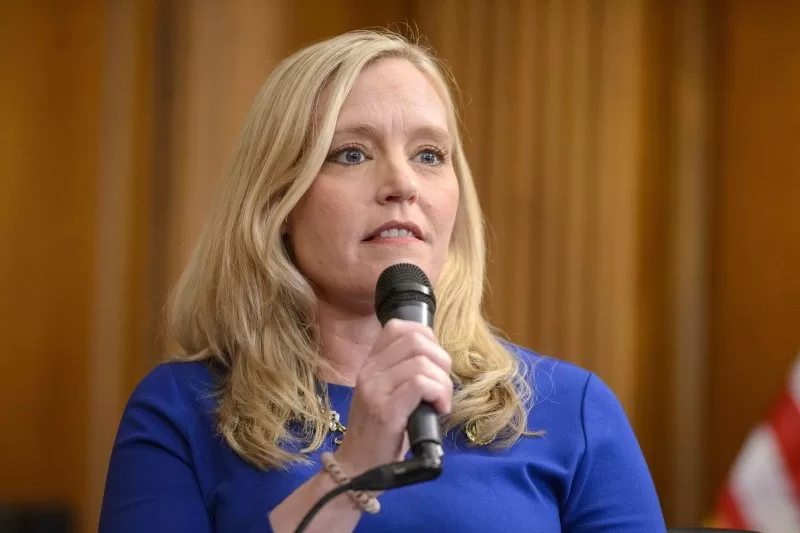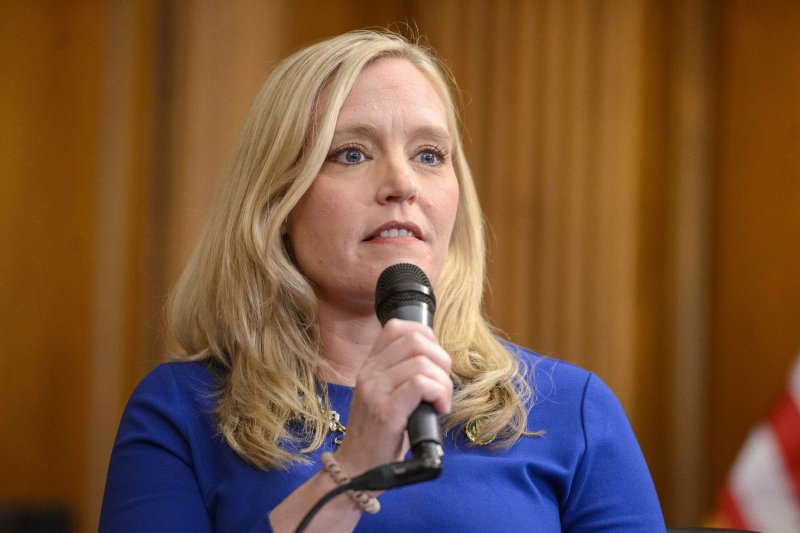1 of 2 | Rep. Erin Houchin, R-Ind., speaks during a news conference on the introduction of the “Parents Bill of Rights” in the Rayburn Room at the U.S. Capitol in Washington, D.C., on March 1, 2023. Houchin and Sen. Bill Cassidy, R-La., co-sponsored a bill introduced on Monday that would create an Oct. 1 deadline for FAFSA applications to be available. File Photo by Bonnie Cash/UPI |
License PhotoJuly 10 (UPI) — The House education committee is marking up a bill Wednesday that would create an Oct. 1 deadline for FAFSA applications to be made available following a botched release last year.
Under the FAFSA Deadline Act, sponsored by Senate Health, Education, Labor, and Pensions Committee ranking member Sen. Bill Cassidy, R-La., he and other members proposed the amendment to the Higher Education Act, on Monday. The bill would move up the deadline for the Department of Education to make FAFSA applications available by three months.
Republicans and Democrats on the education committee were split on the effectiveness of the proposed bill but ultimately agreed to amend it.
Chairwoman Virginia Foxx, R-N.C., and the bill’s co-sponsor Erin Houchin, R-Ind., were critical of the Department of Education and the administration of President Joe Biden for the “failure” to launch a working FAFSA last year. Rep. Robert Scott, D-Va., agreed that the launch of FAFSA was unacceptable but questioned whether a deadline would be helpful.
“This legislation would do nothing to actually fix FAFSA or help students,” Scott said. “It would set the department up for failure just to score some political points.”
The department attempted to revamp the FAFSA application process last year in an effort to make it easier for students to complete. It normally begins accepting applications in the fall but the rollout was delayed until late December.
When students were able to access the application, many were left unable to complete it for months. This was especially an issue for students from low-income or mixed-status families and first-generation borrowers.
“Timely access to the Free Application for Federal Student Aid is essential for making higher education accessible and affordable,” Houchin said in a statement. “The Department’s delays and technical issues during this year’s FAFSA ‘simplification’ launch caused significant confusion and frustration for students and universities.”
James Kvaal, Department of Education undersecretary, told UPI in May that many of the issues with the application process had been resolved.
The department said in an email to UPI that its goal is to have the 2025-2026 FAFSA form available on Oct. 1.
“Our top priority remains delivering a Better FAFSA and improved application experience for the next FAFSA cycle,” Alberto Betancourt, Department of Education press officer, told UPI in an email. “To impose a legislative deadline without providing the additional resources or support needed to launch is simply a political stunt and will not actually help ahead of the ’25-26 launch.”
Student borrower advocacy organizations echoed Betancourt’s call for additional resources.
“It directly impacts long term issues related to the workforce and global competitiveness,” Tanya Ang, executive director for the organization Today’s Students Coalition, told UPI. “If there are resources that are needed in order to help the E.D. make those deadlines it is imperative for Congress and the department to work together to address those resources.”
The legislation proposed by Republicans does not detail any action to be taken if the department does not meet its deadline.
Rep. Bob Good, R-Va., introduced an amendment that would require the Department of Education to certify to Congress that FAFSA will or will not be ready by Oct. 1 a month in advance. If the department certifies that it will not be ready, Secretary Miguel Cardona will be required to testify before the committee with details on why the deadline will not be met and the financial impact of a delay.
“How many students have given up on their dream to go to college because of the Department of Education’s failures?” Good asked. “Students and schools have the right to seek judicial enforcement against unreasonable delays. If Congress sets a statutory deadline, that should be backed up with enforcement action.”
Scott, after reiterating his skepticism about the deadline, spoke in favor of Good’s amendment.
“I do believe it’s important to provide as much transparency as possible for students, families and colleges about the FAFSA process,” he said. “This amendment can actually help because it gives the committee the opportunity to intervene and possibly provide some assistance before it’s too late.”
Karen McCarthy, vice president of public policy for the National Association of Student Financial Aid Administrators, said in a statement that codifying the Oct. 1 deadline has been a top priority for years.
“But cementing an October launch date only addresses a piece of the puzzle; consistency is another. Students must be able to trust that the financial aid application process will function as intended and that they will receive clear communication along the way,” McCarthy said.
“This past year has shown us just how critical it is that all students are able to complete the FAFSA as soon as possible. Even today, there are aspects of the 2024-25 FAFSA system that are not yet functional or working as intended.”
Reid Setzer, government affairs director for The Education Trust, told UPI that while the deadline is important, the focus should be on execution.
“What’s more important is ensuring total functionality of the system, including clear and direct communication with stakeholders so they can accurately counsel students and families,” Setzer said. “Preventing technical issues, unintentional misdirection, repeated re-processing, and poor student and family support should be the primary focus of Congress and the Department in the coming months.”
FAFSA completion rates lagged sorely behind those of previous years through the spring. The Department of Education said it has made “significant progress in closing the gap in FAFSA submissions.”
“We need to move forward from what happened this year,” Ang said. “It’s all hands on deck to work together jointly to make sure this does not happen again. Having Congress, the department and other stakeholders be in the mix and have this be a collaborative effort instead of an attack effort is going to be best for today’s students.”
The FAFSA deadline bill is one of five pieces of legislation the education committee will review on Wednesday.
“The Committee continues to move at an expeditious pace, with the imperatives of meeting the priorities of the American people, and confronting the Biden administration’s wrongheaded policy agenda, at the forefront of our work,” said Sen. Foxx. “These five bills work to achieve those ends. From enhancing workforce data collection to protecting financial options of retirees and savers and ensuring the timely release of FAFSA, our work continues without delay.”

